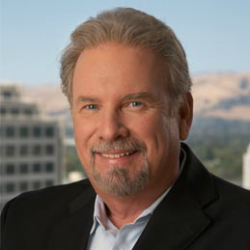

Rob Reid was the CEO of Intacct before its acquisition by Sage. Now MD and EVP at Sage Intacct he is looking forward to the future. Reid has more than 30 years experience in the software industry. He has held several CEO positions and was a Gold winner in the prestigious CEO World Awards in 2014. Enterprise Times spoke to Reid about the acquisition, what inspires him and what the future challenges are for himself, Sage Intacct and the industry.
ET: Who is your inspiration and why?
Rob Reid: I’m a history nut. Abraham Lincoln is my hero and my inspiration. He lived through very stressful times, trying to hold a nation together. He did the correct moral initiative, moved forward with the Emancipation Proclamation, freeing the slaves. I think he knew it’d make the war even harder, but he did the right thing, and stayed true to his moral compass.
ET: How would you describe your leadership style?
Rob Reid: I’m a visionary. I’ve always been involved with disruptive technologies or processes before they were recognised as something that would be viable for business. When I work with my team, I have a very coaching and participatory type of style. I like to empower the team. I think that most people can do 10% to 20% more than they think they can do. Then when they achieve those lofty goals, it really makes them proud of their accomplishments and really enjoy what they do.
ET: What are your personal challenges for the next 12 months?
Rob Reid: That is what my wife keeps asking me. I need to exercise more because you lose 2% of your muscle tone every year after 40. Then hopefully I’ll lose a little weight. Personally, I’ve always been enamoured with photography since I was a young boy. I’m trying to learn more and more new techniques in photography. I also want to learn how to remix music, and this whole EDM movement, even though I’m up there in years.
ET: What was your darkest business day and how did you overcome it?
Rob Reid: I was promised a job years ago when I was a sales guy. If I really succeeded and I hit my current objectives and my quota, I’d be able to go into an advertising role with the company. I’d majored in advertising and it was that I really aspired to do.
I blew my numbers away and went up and asked for the job. The executive that promised me the opportunity just said that he didn’t recall at all making me that promise. He just walked away from me. I left the company, and received a much better job with more responsibility than I’d been promised.
ET: What was your proudest moment?
Rob Reid: Intacct being selected as the best place to work in the mid-market in Silicon Valley for seven straight years. That’s been an ongoing proudest moment, but every time we get that award, I know we’ve touched a lot of people and that’s what inspires me.
ET: Can you share a tip for inexperienced CEOs.
Rob Reid: There are so many demands on CEOs, so many ways that you can be pulled with regard to your strategy.
Delivering a compelling solution to a very specific customer type. Do it better than anyone else in the world and not be pulled and drifting off to do other things. That is a real key to success.
Also, I was classically taught in school that if you don’t have a great strategy and if you don’t have the money to execute against the strategy, things just will never progress. I have found that thinking strategically but spending most of your time on execution is how to really build up a great business. Really diving in and sweating the details from an execution perspective is as important as having a great strategy.
Then, holding people accountable and doing that with mutually agreed upon objectives. Get people to buy into what you’re trying to achieve, how you’re going to achieve it and what they’re specifically going to do to achieve the business results. That’s one of the foundational elements for the great execution that I just talked about.
Finally, play to win. That’s a double entendre. You want to have fun at work, but also focus on how are you going to win.
ET: What was the latest business book you read, or your favourite book or podcast?
Rob Reid: My favourite, because it was a foundation for me in allowing me to achieve the success along with my peers, was really the Seven Habits of Highly Successful Leaders, by Stephen Covey. All seven habits are intuitive. I don’t think anybody would say that doesn’t make any sense. Stephen Covey pulls it all together in his book. If you live those every day, I just don’t know how you can’t be successful in business.
ET: What are your key business challenges for the next 12 months?
Rob Reid: 18 years ago we went through the sea change of Cloud technology. We’re now in that same sort of sea change that’s going on with regard to artificial intelligence and machine learning. It’s going to have a radical change on the way we think and we work. It’s going to be for the positive. There’s a lot of negative being written about how it’s going to remove jobs. In actuality, it’s going to allow it to go to a whole other level of being able to build businesses and have an impact on our society in ways that we could have never imagined.
It’s going to happen very rapidly. We’ll look back five years from now and go, boy, we were really arcane back in 2017 with regard to the way we approached business. It’s just going to make everything more sophisticated and easier to achieve success.
ET: What’s the worst and best decision you’ve made as a CEO?
Rob Reid: People. Focusing on surrounding yourself with great people is the best decision you can make. Holding on to somebody that doesn’t have the ability to achieve success (is the worst). If you hold onto them too long trying to coach them, that can be a bad decision.
ET: What are the key challenges, do you think, faced by the software industry at the moment?
Rob Reid: We have the issue with regard to diversity. We just saw a Google employee being fired about his opinion about ‘is diversity good or not good’. Then Google had to try to move through their values about having diversity and open mindedness without allowing people to attack another gender or religious sector, colour, racist remarks or all that kind of thing.
I think this is a long term issue that we’re going to have to work through with regard to diversity. Mainly it has to do with male and female. There aren’t enough females in the technology industry. I applaud a lot of the industry leaders for having coding camps for girls in high school. So that we can get more diversity for the long term. In the short term, it’s going to be hard to do it.
ET: Have you ever looked at your own gender pay gap as Salesforce did?
Rob Reid: I’ve been with the company for eight years, we’ve always made sure that females and males are being paid the same for the same job. We do not have an issue. That’s one of our values that we hold dear too. The day I walked in I said: “We will always pay the same, we cannot ever have an issue.”
ET: We’re seeing a lot of companies try to accelerate deployment of solutions. What is Intacct doing?
Rob Reid: That was one of our original tenets as we started as organisation, going after small and medium sized businesses. We recognise that the types of customers we serve did not have a lot of staff. They want a system that could be set up easily. One that could adapt to the business processes as they change in a growth oriented organisation. These were requirements that we set from the get go that we had to be the best in the world at doing.
Our average customer gets deployed in about eight weeks. Most of that time is not around about setting the Intacct system up or getting the data into the system. It’s about the company’s team planning. How they’re going to be able to do things so much more effectively and efficiently. I think the fastest I’ve ever heard us getting deployed is two days, but obviously that is the extreme. That was with a CFO that had planned everything out ahead of time.
Every year we track our accomplishments. 90% of all of our customers come in under what we had told them the budget would be for the implementation. They were implemented faster than the original timeline that we currently and mutually work with them on.
That’s an area that everybody else is trying to catch us on, as opposed to us trying to figure out how we’re going to do a good job there.
ET: Is the Sage transaction complete now?
Rob Reid: Yes, we are officially Sage Intacct. We’re really excited about our opportunity, it’s been just extremely rewarding to be working with the new Sage management team, headed up by Stephen Kelly. It’s an organisation now that’s focused on growth, focused on Cloud first, focused on customer and having a customer for life by doing a great job for them.
Stephen Kelly, his team’s values and Intacct’s values are almost perfectly aligned. We were planning on moving to an IPO. We were going to take the funds from the IPO to go worldwide. They are in 23 countries and we were in two countries they weren’t in. We have development centres in India and Romania, so now we’re in 25 countries. Sage is also going to be investing in us even more than we were able to as an independent company. We’re very excited about this next chapter as we’re moving into being part of the Sage Organisation on a worldwide basis.
Sage has been extremely respectful about what Intacct has done. They don’t want to change any of the momentum we have. We are a separate entity within Sage and they want us to continue to keep our business moving forward. Keep being the growth oriented engine that we are and taking care of customers and being innovative. Our whole management team has moved on over and is committed to Sage for years to come. We’re all really excited about continuing with this journey into the next chapter.
ET: During the process, was there any pivotal memory you’re always going to remember?
Rob Reid: Yes. We asked Stephen Kelly and Steve Hare how were they going to be measured as to this being successful. They told us that the board was looking at them to making sure that Intacct was able to continue to grow at a rapid pace. They were going to be measured on employee retention and also customer satisfaction. That was just music to my ears.
I thought that that was the moment of, “this is really going to work”. Mergers are hard, and many fail. I have been working with them now for a long period of time (since January 2017). At every opportunity, they’ve gone out of their way to make sure that we keep the momentum, keep our culture, and that we really figure out how we get this to be one plus one equalling three. Not being one minus one equalling zero.
ET: You have a very deep integration with Salesforce at the moment. Did you ever looking to actually migrate your solution onto the Salesforce platform at all?
Rob Reid: Yes. We looked at it about 10 years ago. We were one of the first cloud solutions out there and made heavy investments in all the infrastructure. It’s better for us to continue building on our current platform which the is virtually the same architecture as Facebook. It’s the most scalable architecture in the world. Facebook’s got billions of users attacking their solution every day, and getting great response.
We made the decision that we’re going to continue to invest in new functionality as opposed to changing our infrastructure. Moving to the Salesforce platform provides some consistent UI and better mobility. However, because of our open API approach, it doesn’t advance us with regard to integrating with other applications. Additionally our costs are dramatically lower than what we would have paid being on the Salesforce platform.
If we have started five, seven years later, we probably would’ve done it. The fact is that we made that initial investment and we made all the right calls architecturally. We’re in good stead with continuing with being on our platform.
ET: Is this a job well done, or is there a longer term future for Rob Reid inside of Sage?
Rob Reid: I just told you that I’m committed for years to come. I’m moving into the next chapter also with all my other colleagues at Sage Intacct. I’m very excited about the opportunities between AI, expansion of marketplaces and expansion geographically. We also have the resources of one of the largest financial management vendors in the world available and being offered to us.
It’s just going to accelerate our overall business and our solutions for our customers. I couldn’t be in a better position. I think the rest of the Intacct organisation are all extremely excited about this new stage that we’ve moved into.
ET: Do you make time to talk with other CEOs, and if so, how much time?
Rob Reid: Over the last eight years a number of great VCs had invested in Intacct. Virtually every one of them has ongoing CEO leadership forums. They also have best practise forums that the majority of us attend. We really do talk through the trends, and issues that we’re up against. Sometimes they’re very topical subjects and sometimes they’re just ongoing such as how do you improve the business? Sometimes, they’re talking about technology or the most relevant best practises on retention of employees and the development of talent.
I typically went about every other month. This also ties back a little bit to the Seven Habits of Highly Successful Leaders. One of those habits is sharpening the saw. What Covey meant by that is, every day you have the responsibility to try to figure out how to be better than you were the day before.
It’s a journey where you have to continue to stay always in a learning environment. Always trying to be better than you have been in the past, and then making your organisation better than it was in the past.
ET: What’s the one question you’d like to ask another CEO to answer?
Rob Reid: How are you going to change the world for the betterment of society. Very interesting, the answers you get. There’s a book called Start with Why by Simon Sinek. He just talks about what most people do in business, if they think about the how and what. What we do is this, and this is how we do it.
He’s saying the most relevant organisations that really get a following are the organisations that concentrate on why. Why are we doing this and how are we making the world better because of what we do? That’s a fundamental concept that if you embrace it, everything is easier. People want to be associated with you, because of your why. It’s a much more emotional attachment that you can get from your employees and your customers.
At Intacct it was, we want to change the way people think and work for the betterment of their organisation and society. There wasn’t anything in there about accounting or financial management or technology, it’s about how can we be a catalyst to improve everybody that’s using our solution? It just inspires people to want to achieve more. We’re constantly asking ourselves, how is this changing for the betterment of the way a organisation would approach their mission or their overall business? Then it causes our whole organisation to think at a higher level and not get caught up down technically in the weeds.
Simon goes on in the book, and he does a superb job of not just attaching in that with business, but with you as an individual. It’s a very compelling book to read, and he’s also got a TED Talk, it only takes 20 minutes. I would recommend you to view his TED Talk, because he really gets you to think about it. What is your personal why? Why are you here? How are you having an impact in the world? I had a mentor that once said: “what’s your epitaph going to be when you die? What are people going to say about what kind of impact you had in the world, and then now, projected today, as to what you want them to say, and then go achieve that.”
Simon talks about not just doing it for business, but doing it for yourself.
ET Thank you Rob.


























